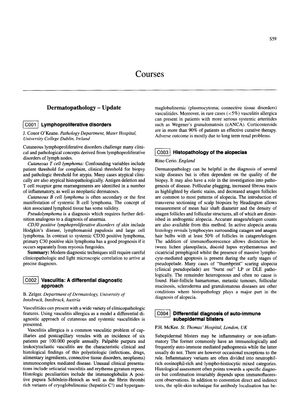C002 Vasculitis: A Differential Diagnostic Approach
September 1997
in “
Journal of The European Academy of Dermatology and Venereology
”
vasculitis vasculitis allergica capillaries postcapillary venules palpable purpura leukocytoclastic vasculitis immunocomplex urticarial vasculitis erythema gyratum repens immunoglobulin A purpura Schönlein-Henoch fibrin thrombi hepatitis C plasmocytoma systemic arteritides Wegener's granulomatosis corticosteroids IgA Henoch-Schönlein purpura HSP steroids

TLDR The document concludes that corticosteroids effectively treat vasculitis allergica in over 90% of cases, with long-term kidney issues being the main adverse outcome.
The document presents a differential diagnostic approach to vasculitis, focusing on vasculitis allergica, which affects capillaries and postcapillary venules with an incidence of six patients per 100,000 people annually. It is characterized by palpable purpura and leukocytoclastic vasculitis and can be caused by various factors such as infections, drugs, alimentary ingredients, connective tissue disorders, and neoplasms. The disease is immunocomplex mediated and can have unusual clinical presentations like urticarial vasculitis and erythema gyratum repens. Histologically, it can show immunoglobulin A positive purpura Schönlein-Henoch and fibrin thrombi rich variants associated with conditions like hepatitis C and plasmocytoma. In rare cases (<5%), it can be associated with more serious systemic arteritides like Wegener's granulomatosis. Corticosteroids are effective in more than 90% of patients, with adverse outcomes mostly due to long-term renal problems.




